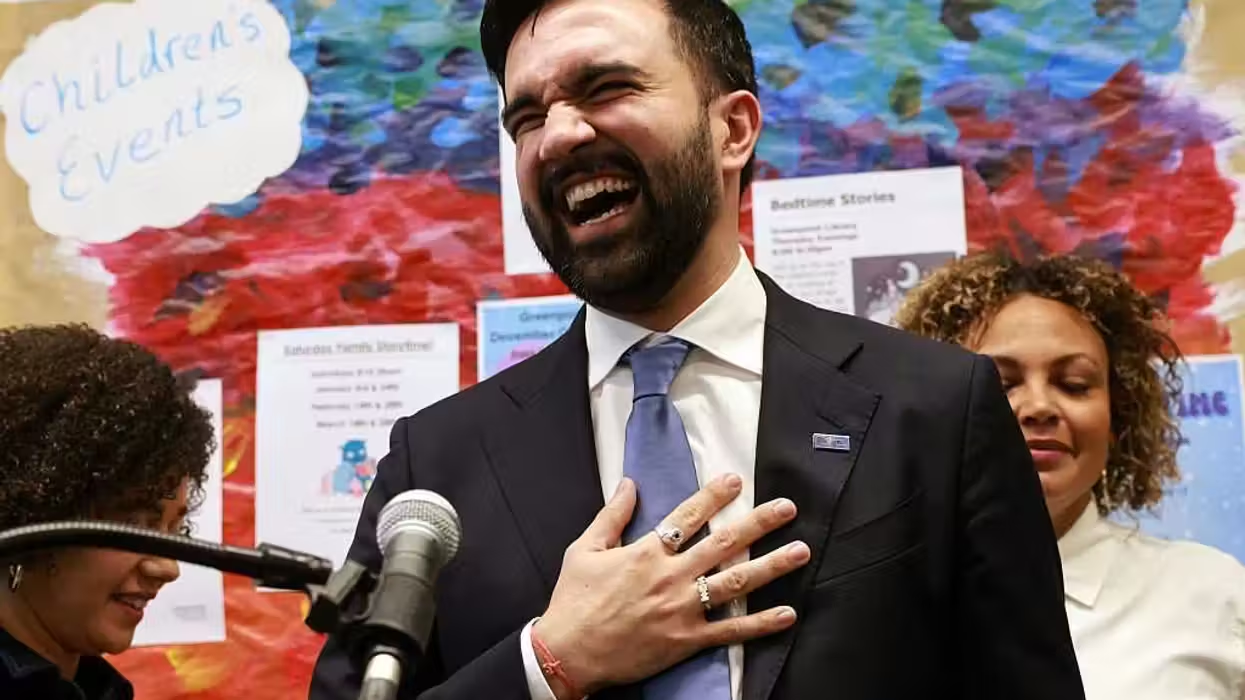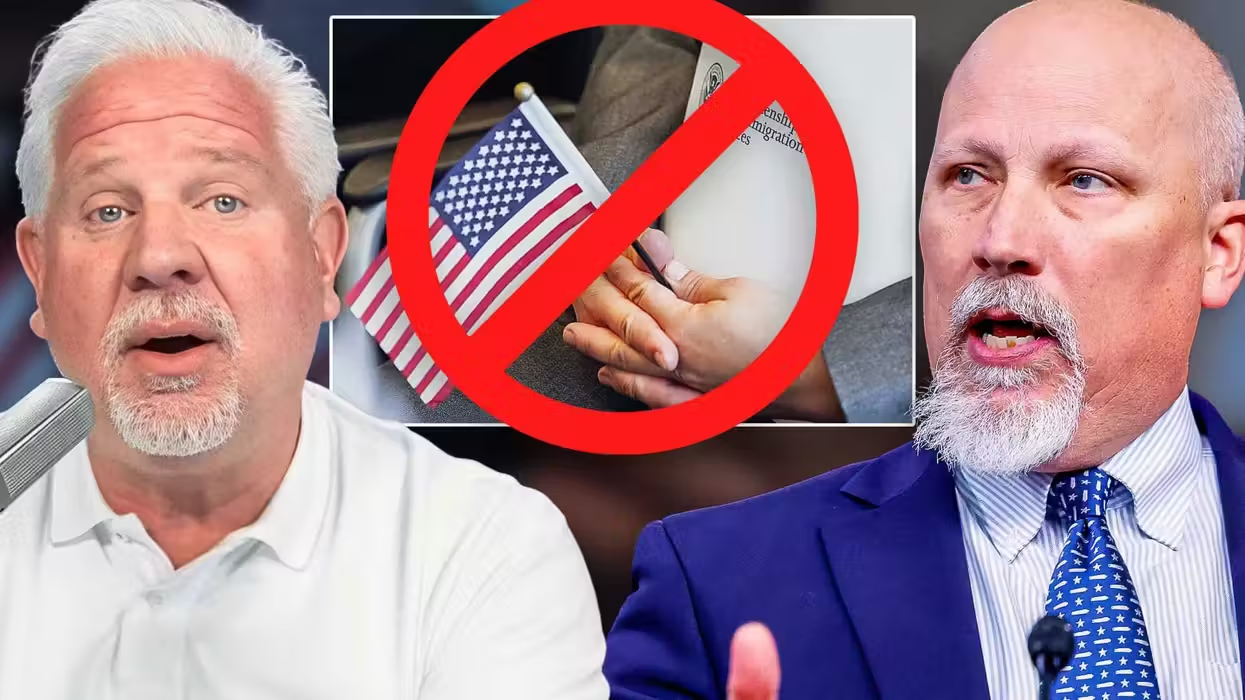
© 2025 Blaze Media LLC. All rights reserved.
Is Christianity in America Really Going Extinct? Gallup Editor's Claims May Shock You
January 10, 2013
"If someone from Mars arrived in this planet and investigated religion in the U.S., they would say, 'This is a remarkably religious country at this point.'"
Gallup's editor-in-chief Frank Newport has been attracting widespread attention over the past few months surrounding his intriguing assessment of the state of faith in America -- and his predictions that a religiously-fruitful time may be ahead.
Part of the intrigue surrounding Newport's research comes from his assertion that religion in the U.S. is actually much healthier than many critics allege. In an interview with TheBlaze, he spoke about Gallup's intensive research, as presented in his new book, "God Is Alive and Well."
Considering the rise of the "nones" -- a group of religiously-unaffiliated Americans, when asked if religion in America is dying, Newport had an intriguing answer. He argues that faith in the U.S., rather than sputtering out, is actually evolving.
"Faith and religion is very much alive and well -- a key point is, it's changing," the researcher told TheBlaze. "The way people manifest their religiosity has changed over time. That's not unusual."
Rather than seeing religion as on the cusp of disappearing, Newport -- based on Gallup's research into matters of faith and religion -- argues that many Americans are transitioning into an "unbranded religion." This essentially means that, increasingly, individuals classify themselves as unaligned with a denomination, yet they are still very much Christian (the majority faith culture here in the U.S.).
Even though, numerically speaking, the proportion of "nones" has grown, the researcher claims that much of the hoopla over the increase may be misplaced. The numbers of unaffiliated may, in fact, be growing as a result of a change in reporting styles.
"We have changes in the way that people respond to questions now. People feel more comfortable saying 'I'm nothing -- I was raised a Catholic and I'm not anything now,'" he noted, also offering up a caveat about the false assumption that "unaffiliated" is indicative of atheist or agnostic. "A lot of those nones still are spiritual and religious when you measure it in different ways."
As for the "nones," the researcher also alleged that their growth may be overstated and that the proportion, when compared year-to-year, may be leveling off.
"The level of increase in 2012 compared to 2011 is the smallest increase we've seen in the last five," he noted (Gallup data released this week shows that the proportion of religiously-unaffiliated Americans has, indeed, slowed in its expansion).
While some might dismiss Newport's claims, he told TheBlaze that these aren't opinions; they are realities based on more than one million Gallup interviews that he has analyzed. As a social scientist, he explained that his job isn't to provide personal perspective; instead, his role is to report what the American public thinks -- a task that has led him to these intriguing conclusions.
 Gallup's editor-in-chief Frank Newport (Photo Credit: Frank Newport)
Gallup's editor-in-chief Frank Newport (Photo Credit: Frank Newport)
When asked to describe some of the indicators that back up his conclusion that America "is a very religious country," Newport gladly obliged. Among his reasons for seeing a healthy and vibrant religious sentiment, the Gallup editor-in-chief noted that belief in God has remained "remarkably high." According to his analysis, more than 90 percent of the nation embraces the concept of a higher power.
Church attendance, too, when examining decades of data, appears to be relatively unchanged. Newport did note that it was higher in the 1950s, but that it has remained fairly level since that time. In the end, he simply doesn't see a reason for alarm.
"If someone from Mars arrived in this planet and investigated religion in the U.S., they would say, 'This is a remarkably religious country at this point,'" Newport continued.
Some naysayers may reluctantly accept these ideals, while advancing the notion that the future is less-than-bright on the religious front. But the Gallup staffer rejects this claim, too, and actually believes that faith is headed for a possible resurgence in American life.
"As I analyzed the data -- I certainly would not predict a 'Great Awakening,' but it is certainly possible that the influence of religion will increase [and] not decrease in the years ahead," he told TheBlaze.
Not surprisingly, he confirmed that age plays a major role and that, as people grow older, religious adherence increases. The most religious age, according to Newport? Eighty. The least? Twenty-three. As the Baby Boomers -- a massive generation, to say the least -- grow old, there's possible growth in religious sentiment that will accompany the nation's demographic change.
He also argued that people tend to gain in their religiosity when they hit their 30s and 40s and, if today's young people follow history's blueprint, "they will get more religious as they get older."
Newport described himself as a church-goer and a Christian. His new book, "God Is Alive and Well," released in Dec. 2012, explores the aforementioned issues in detail. For new data about the "nones" and to explore this issue further, go here.
--
Related:
Want to leave a tip?
We answer to you. Help keep our content free of advertisers and big tech censorship by leaving a tip today.
Want to join the conversation?
Already a subscriber?
Billy Hallowell is a digital TV host and interviewer for Faithwire and CBN News and the co-host of CBN’s "Quick Start Podcast."
Billy Hallowell
Billy Hallowell is a digital TV host and interviewer for Faithwire and CBN News and the co-host of CBN’s "Quick Start Podcast."
more stories
Sign up for the Blaze newsletter
By signing up, you agree to our Privacy Policy and Terms of Use, and agree to receive content that may sometimes include advertisements. You may opt out at any time.
Related Content
© 2025 Blaze Media LLC. All rights reserved.
Get the stories that matter most delivered directly to your inbox.
By signing up, you agree to our Privacy Policy and Terms of Use, and agree to receive content that may sometimes include advertisements. You may opt out at any time.






